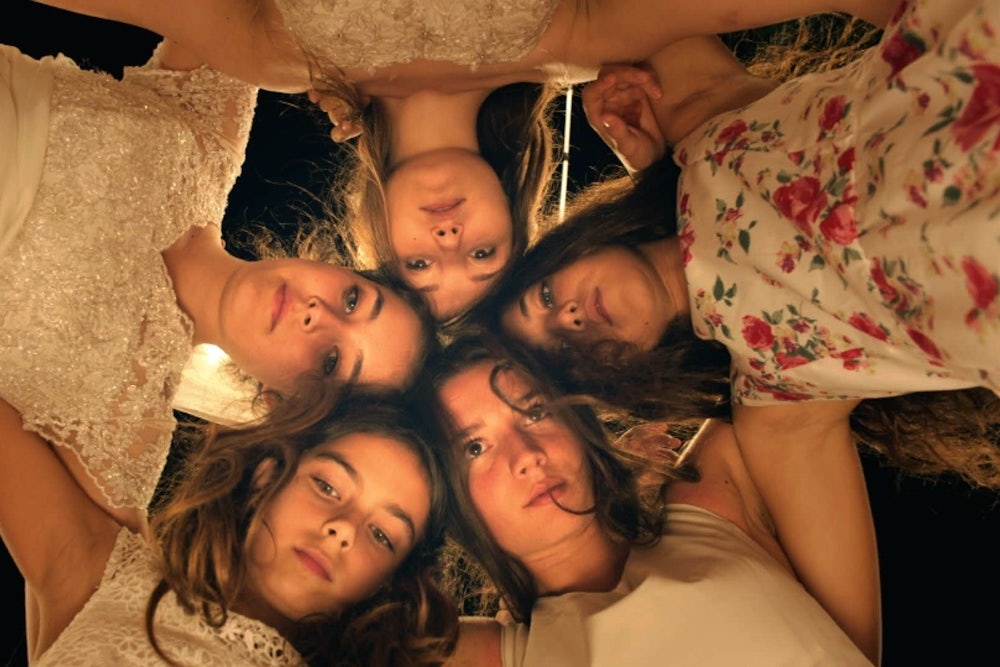There’s one moment of real freedom in Mustang, France’s Turkish-language nominee for the Best Foreign Language Film Oscar. Lale, a precocious preteen, sneaks out of her house to go to a football match. Only women fans are allowed at this particular game—the men have been banned from the stadium for rioting too much. She and her four older sisters crawl undetected past the watchful eyes of a neighbor, chase after a bus, and hitch a ride with a truck driver. When they finally get to the stadium, the camera focuses on Lale (Güneş Şensoy) and her sisters dancing and chanting, utterly free, surrounded by thousands of other women in a quintessentially male arena. We don’t see the game at all, only the girls in their happiness.
This focus on female experience is key to Mustang, the directorial debut of Deniz Gamze Ergüven, one of only two women directors nominated for an Oscar this year. (The other, for the record, is Liz Garbus, who directed the documentary What Happened, Miss Simone?) The five sisters are raised by their grandmother and uncle in a remote, conservative town on the Black Sea. On the last day of school, they decide to walk home, and along the way, they play with some male classmates in the water, riding on the boys’ shoulders and trying to knock each other off. As soon as they get home, however, their grandmother beats them one by one, from oldest to youngest, for “pleasuring themselves on boys’ necks.” The news of their scandalous behavior spreads across the village, and the entire family is shamed.
The house becomes a prison. The girls aren’t allowed anything that might further corrupt them. Their phones, computers, and makeup are confiscated; they’re forced to wear “shapeless, shit-colored dresses,” as Lale puts it; bars and locks are installed over the windows. Instead of school, the girls are instructed by a series of women in the arts of keeping house, from stuffing a mattress to cooking. And, one by one, they are married off.
The story isn’t particularly original, but Mustang’s achievement is to criticize a society that sexualizes everything women do while still celebrating the girls’ sexuality. The movie pulsates with the sisters’ raw, youthful sexuality, all lips and legs and flowing hair—the same sexuality that so threatens those who wish to contain it. It spends a good amount of time depicting young women in their underwear, but it never feels exploitative. Instead, these scenes of the sisters tanning in bikinis, dancing in their bras stuffed with toilet paper, or just changing their clothes feel intimate and natural, like a home video of real sisters. For all the sharpness of its commentary, the movie feels dreamy and languid, with colors reminiscent of Peter Weir’s Picnic at Hanging Rock (1975), a classic about the sexuality of adolescent girls.
This naturalism comes at the cost of character development. Lale aside, the sisters are virtually indistinguishable. The oldest, Sonay (Ilayda Akdoğan), has a boyfriend, but other than that there’s nothing particularly memorable or unique about each individual girl. That’s how they appear to the many suitors who come calling, interchangeable so long as they serve tea and bleed on their wedding night. The man intended for Sonay ends up with the second-oldest sister, Selma, without a second thought. In a movie that so celebrates women in all their complexity, it’s a shame that the audience ends up seeing these women in a similar light, struggling to tell them apart as they’re shipped out on the wife assembly line.
Lale grows increasingly determined to avoid what befalls her sisters, and in its last third Mustang becomes an escape drama. But it is in its softer moments, in the sisters’ wordless communications, in their quiet affection for each other, that the movie really resonates. This is a movie about how a society imprisons women, but these girls, even within its walls, can’t be tamed.
For more Oscar coverage, click here.
